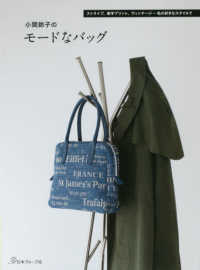- ホーム
- > 洋書
- > 英文書
- > Philosophy
Full Description
Drawing on over four decades of professional and academic experience, Susan Long explores how the concept of the unconscious has evolved from the nineteenth to the twenty-first century, showing that it is more than an individual phenomenon, but also a group, organisational and institutional phenomena.
Each chapter examines theories that use the idea of the unconscious, first covering the work of Schelling, Freud, Bion, and Lacan. After examining traditional psychoanalytic ethos, the author takes a look at the mid-twentieth century extension of the meaning of the unconscious towards the social field. Here, she explores three main traditional categories of approaches: the Neo-Freudians, the Frankfurt School and social scientists, historians and anthropologists. The book also covers the idea of approaching the unconscious from the perspective of the neurosciences, as well as its connections with nature, showing a broader, more cosmic view of the unconscious in nature and the universe. Lastly, Long looks at how we might understand today's organisations and society through the lens of the changing ideas presented throughout the book.
Broad sweeping and accessible, this book is a valuable resource for organisational psychologists, consultants, and managers exploring psychoanalytic and socioanalytic approaches, as well as those in academic settings wanting to pursue an interest in the unconscious.
Contents
1. Introduction 2. Schelling - The Beginnings 3. Freud - The Repressed Unconscious 4. Bion - The Infinite Unconscious 5. Lacan - The Unconscious Structured like a Language is Structured 6. The Unconscious in Social Theory 7. The Social Unconscious 8. The Unconscious in Organisations 9. The Unconscious in Neuropsychoanalysis 10. The Unconscious in Nature 11. The Spirit in Things 12. Theories of the Unconscious Revisited in the Light of Spirit







